
By Tomoko Yamamiya
Tokyo Correspondent
In Japan we are experiencing the rainy season now. Everyone knows that once the rainy season begins in early June that summer is right around the corner. Many find summer in Japan to be bittersweet. We are not very big fans of cold temperatures, but as an island country the heat and humidity can be unbearable. As time goes by, the climate appears to gradually get hotter as well. As a result, many of us use air conditioners a lot during this season to keep us cool and comfortable.
Tokyo Correspondent
In Japan we are experiencing the rainy season now. Everyone knows that once the rainy season begins in early June that summer is right around the corner. Many find summer in Japan to be bittersweet. We are not very big fans of cold temperatures, but as an island country the heat and humidity can be unbearable. As time goes by, the climate appears to gradually get hotter as well. As a result, many of us use air conditioners a lot during this season to keep us cool and comfortable.

Due to the natural disasters that occurred in the Tohoku region in March 2011, the rest of the country has been effected tremendously. Many people in the Kanto region are experiencing limited to no electricity in their businesses and homes sporadically throughout the day. We often hear the word Setsu-den these days, which means saving electricity. As many know, Japan is known for its specialization in the high tech industry and we are one of the largest consumers of electricity in the world every year.
Our nation depends a lot on the electricity generated by nuclear power, hence why we have a lot of nuclear plants all over Japan. Nuclear power generates 30% of all the electricity consumed. However, when the Tohoku earthquake and the accident at the Fukushima nuclear plant occurred in 2011, a lot of people thought the generation of electricity by nuclear power was very dangerous. Many have argued that we shouldn't rely on it and search for alternative ways to obtain energy.
After the earthquake, most of the nuclear plants were ordered to stop working. On May 5th 2012, all nuclear plants in Japan were forced to temporarily shut down. Fear has spread that by having nuclear power plants, disasters like those in Fukushima could reoccur in the future. Others say we need nuclear power as a major generator of our electricity to maintain the same commodities we enjoyed in the past. However, the hot Japanese summer has arrived and we must once again find alternative ways to save electricity this summer.
Our nation depends a lot on the electricity generated by nuclear power, hence why we have a lot of nuclear plants all over Japan. Nuclear power generates 30% of all the electricity consumed. However, when the Tohoku earthquake and the accident at the Fukushima nuclear plant occurred in 2011, a lot of people thought the generation of electricity by nuclear power was very dangerous. Many have argued that we shouldn't rely on it and search for alternative ways to obtain energy.
After the earthquake, most of the nuclear plants were ordered to stop working. On May 5th 2012, all nuclear plants in Japan were forced to temporarily shut down. Fear has spread that by having nuclear power plants, disasters like those in Fukushima could reoccur in the future. Others say we need nuclear power as a major generator of our electricity to maintain the same commodities we enjoyed in the past. However, the hot Japanese summer has arrived and we must once again find alternative ways to save electricity this summer.
 RSS Feed
RSS Feed

